Living on the Med in Turkey
October 2011
Tales of Transition
By Colin Guest
Before going to Turkey, my wife Jenny and I were thinking of moving to Spain to live. Therefore, I was very surprised that after being in Turkey for only five weeks, Jenny said: “After you finish your contract, why don’t we buy a plot of land and have a house built?”
I said, “I thought that we were going to live in Spain.”
“No, I love it here,“ she replied. “Turkey is much better than Spain.”
We moved to Turkey from England in 1988, when I accepted a contract to work as an advisor for the interior-finishing work on a hotel complex in Kemer. I was pleased to find that Kemer was in a beautiful location, being right on the edge of the Mediterranean, backed by the pine-forested Taurus Mountains . The hotel complex was just outside of Kemer and set among several coves next to a long sandy beach; overall, it was perfect. We did not live in the hotel, however, but in a furnished apartment above a Turkish carpet shop in the main street.
After I mentioned to a colleague at work that Jenny and I were interested in building a home, he said, “A Turkish friend of mine is looking to find a piece of land to build a house on; why don’t you and he buy a plot of land between you?” He later introduced Jenny and me to Amhed, his Turkish friend, who along with his two brothers owned their own construction company. A few weeks after we agreed to buy a plot of land between us, Amhed took us to see some land in a village approximately 9 km out from Kemer.
As we drove out in the country, down narrow unpaved lanes lined with orange, lemon and pomegranate trees, I thought that Jenny, who was a town girl, would not be interested in this land. When we finally stopped and got out of the car, we had to jump across a stream before walking into a field with a number of orange trees growing in it. The land was approximately 2,500 square meters with beautiful mountain views. Amhed asked Jenny what she thought, and I was both amazed and very happy when she replied: “This is perfect, and it’s really beautiful.” We bought the plot of land, with Amhed’s company then designing and building four 3-bedroom houses. That was over twenty years ago, and I still live in the same house.
On completion of the house, we arranged for an international transport company to send various items from our house in England over to Turkey. The company promised delivery within two weeks of our goods leaving the UK. In fact, it took nearly three months before our goods finally cleared customs in Istanbul and arrived at our house.
Shortly after moving into our new house, we decided that we would bring our dog Ashley over from England . At the time, we were paying a family to look after him. Jenny had a trip planned to England and arranged to bring him back with her on the same plane, traveling as excess luggage, as this was the cheapest way to transport him. I met my wife at the airport and we were waiting for her luggage to arrive when we heard a sudden commotion. Everyone was staring and pointing towards the luggage conveyer belt, on which was a large crate with a man walking along each side of it. We suddenly realised that the crate must contain our dog. At the time he arrived, there were very few dogs in our village, and being a large rough collie, he attracted a lot of attention wherever he went. When I took him out for a walk one day, I found a Turkish woman sitting outside our gate with a camera, waiting to take a photo of my dog.
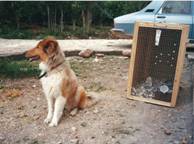
Ashley on arrival in Turkey
During our first two years in Kemer, I worked on the hotel project that, on completion, became the best hotel in the area. Kemer at that time was a small village in the process of development, with only a few people who could speak English. Many of the shopkeepers and workers could speak German, which was necessary, because 98% of tourists visiting Kemer were German. At first it was difficult when shopping, but we soon managed to be understood using pidgin Turkish and pointing at what we wanted to buy.
Although at the time there were only a handful of English people living in Kemer, we had an active social life and made several very good Turkish friends. We met our English friends most evenings either at a bar run by English owners or at another bar operated by an English-speaking Turkish man. The latter bar became our local favorite, with the proprietor becoming a very good friend, and here we met and made various Turkish friends. As I had a company car, we were able to drive to the beach or over to Antalya on my day off work. I made friends with several of my Turkish work colleagues who learnt English from me while I learnt some Turkish from them.
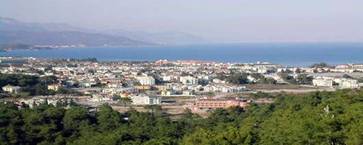
View of Kemer
Over the years, Kemer has become a very popular resort town with a large number of Norwegians, plus a number of English who have bought holiday homes either in town or in the surrounding villages. In my village there is a complex of 40 villas, owned mainly by Norwegians. Many of them have become good friends, and I have even been a guest at one friend’s house in Norway .
Ex-President Ozal has described the area where I live as the Monte Carlo of Turkey. “Once you have visited here you will know why,” he said. This region, known as the “Turkish Riviera,” is the country’s tourism capital. What with sun, sea, stunning scenery, inexpensive living costs, no pollution, and the warm hospitality of the Turkish people, it is like living in paradise. I know that when I draw back the curtains in the morning and look out at the scenic view of the mountains – including a view of the top of one of the longest and highest aerial cableways in the world – it makes me feel good to be alive. With over 300 days of sunshine a year and a relaxing atmosphere, it is certainly very different from living in the UK .
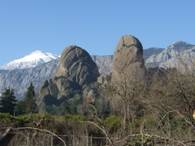
View to the top of the Tahtali aerial cableway
Public transport is inexpensive, with frequent service by modern air-conditioned buses to all the villages, as well as to Antalya . The bus fare from my house to Kemer, which is approximately 9 km, costs 1TL, while the fare to Antalya, a distance of approx 50 km, is only six TL (€2).
When driving in Turkey you have to be very observant, as there are more deaths on the roads in Turkey than in any other country in Europe . This situation is generally due to drivers traveling at too high a speed, both in and out of town and even in rainy conditions. Double and single lines normally mean no overtaking, but unfortunately, that does not seem to apply here. Even when the traffic lights are on green, you have to check before pulling out, as some drivers will go straight through a red light if they think they can get away with it.
As there is very little crime in this area, it is quite safe to walk around without worrying about being mugged. You are more likely to find yourself invited into a shop or a village house for a glass of çay (tea). Turkish people are very friendly and hospitable; you can be sure of a warm greeting and made to feel welcome wherever you go. I have found that while shopping, if I accidentally give too much money to a shopkeeper, he informs me and hands back the difference.
Unfortunately, as in all countries, you might trust some people—as you think they are your friends—but it can turn out that they are just after your money. I lost all my money after trusting what I mistakenly thought was my best Turkish friend. While I was helping him at his restaurant, he told everyone that I was his father, as I helped him more than his own father did. I, in return, called him my son. However, it turned out that he was just a big con-man who has cheated not only his friends but also his wife and her family.
During the twenty-plus years that I have lived here, I have traveled to work on a variety of interior finishing contracts in over 12 countries. This enabled me and my wife – who died of cancer in 2007 – to have a very good life without the necessity of my having to work in Turkey . I have also worked as a volunteer at wild animal rescue centres in South Africa and Thailand, which I enjoyed very much. For retired people like me, who like a peaceful life, living here is very good. However, if you need to work to support yourself, then that is a different story, as you must obtain a work permit, which is not easy to do.
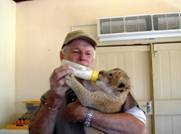
Feeding lion cub in S.A.
Over the years, I have made a number of Turkish friends, ranging from shop boys to successful business people. If at any time I have a problem, a simple phone call usually supplies an answer. This is very helpful for me, as (although I have lived here for many years) I do not speak much Turkish. I put this down to the fact that my wife could speak and understand Turkish very well. After completing a Tefal course, she gave private English teaching lessons to a variety of Turkish people, an activity which greatly assisted her in learning Turkish. I , unfortunately, took advantage of this and did not bother to persevere when trying to learn to speak Turkish while she was alive.
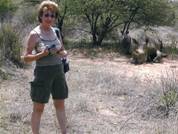
Jenny at Mokolodi in S.A.
On the social side, as there is very little to do in Kemer, I spend more time with my friends, especially with my German neighbours. However, during July and August, when the temperature can be in the 50s, most friends either go on holiday or do not visit here. For social activities, I find it best to travel over to Antalya , which is the fifth-largest city in Turkey.
Although the cost of living here has risen over the past few years (due to very low taxes) it is still far cheaper when compared with the UK . With mainly sunny days—plus having solar electric hot water—my electricity bills are quite reasonable. In this area, gas is supplied in bottles, and is used mainly for cooking. A standard refillable bottle costs approx 60TL and normally lasts me two to three months. One of the most expensive items here is petrol, which costs more than it does in the UK . Cars, both new and secondhand, are also more expensive here.
Apart from when I had double pneumonia, which I caught while on a visit to the UK, my general health has been very good while living here. I put this down to plenty of sunshine, a Mediterranean diet, and the daily exercise of taking my dog out for a walk before breakfast and again before dinner.
I find that there is very little to dislike here, but I must admit that the road to my house needs improving. It is full of potholes, and during the winter it can be flooded to such an extent that it is impossible for me to drive out. In general, I am quite happy living here and have no plans at present to move elsewhere, as it would be hard to find somewhere equal to or better than the place where I presently live.
© 2011 by Colin Guest. All rights reserved. Photographs provided by the author.
Colin Guest is a 70-year-old man who has spent around 20 years working in various countries around the world. Due to his interest in wildlife and conservation work, he is a member of Greenpeace, Sea Shepherd, Care for the Wild, IFAW and Ecological Internet. He has worked as a volunteer at animal rescue centres and also adopted a tiger and an orangutan via “Care for the Wild," www.careforthewild.org , as a way of giving something back to nature.



